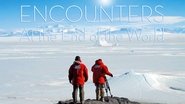hrkepler
'Encounters at the End of the World' is simply amazing film. Beautiful photography, smooth and calm narrator by director Werner Herzog himself (and not without his sarcastic humor - abomination like aerobics studio and yoga classes), wonderful people and seals whose singing were obviously ripped off by Pink Floyd. This film is entertaining and eyeopening at the same time. In the sense of explaining everything it is not the greatest film, but that is not the purpose of 'Encounters'. It gives us nice glimpse of people who work at the research center in Antarctica. And what a wonderful people they are - where else than in Antarctica you can meet and plumber who is Aztec royalty heritage. Or a sci-fi fan cell-biologist who shares his own interesting theory why we evolved out of the oceans. Quirky and wonderful people living on the haunting cold landscape.Even after ten years of it's first release 'Encounters' raises valid and relevant philosophical questions about survival of human species.
Radu Martin
To begin with, it is my belief that this is one of the few documentaries that not only presents you information but is there to teach you something without you even noticing the whole process of scientific explanations being delivered and philosophical ideas being expounded. It is interesting how naturally the documentary combines the 'place' with the 'people' even if in the first place it didn't seem natural to find such people in such a place. Moreover the life stories of the scientists and researchers are nevertheless fascinating giving you a introspection into the bizarre 'end of the world' and its profound meanings to them and to us.
Cosmoeticadotcom
Werner Herzog's career, the last couple of decades, has been far more focused on documentaries than on fiction films. His classic fiction films are almost all from the mid-1980s or earlier, whereas his notable documentaries are almost all since that era. Encounters At The End Of The World, a 100 minute long film, released in 2007, is among the very best of that later output. It follows the 2006-2007 austral summer journey of Herzog and his cinematographer Peter Zeitlinger to Antarctica.The film is, by Herzog's own account, not going to be like a National Geographic documentary, not like March Of The Penguins, a film that he despises. Many of the underwater shots had previously been used in Herzog's earlier film, The Wild Blue Yonder, a puzzling pseudo-science fiction mishmash. The scenes of light pervading under the ice is very reminiscent of the claims of Near Death Experiencers. Make no mistake, though, about this film- it is no mishmash- it cuts directly to the heart of Herzog's ideas of the cosmos: that it is indifferent, if not cruel, and that it often likes to torture the living. And, while the film shows these tendencies in nature, to a degree, it most definitely shows this in the inhabitants of Antarctica- the people of the largest American station on the continent, at McMurdo Station, in the Ross Sea. The station looks like something out of an 1890s Yukon Gold Rush mining town.Herzog seems to find most of them fascinating, but, if they are, it's in the hours of footage that Herzog likely spent interviewing many of the thousand or so summer inhabitants, because what is left on the screen is fascinating, only in the bizarre manner that one might have described Timothy Treadwell, the lunatic death wish idiot from Herzog's Grizzly Man as fascinating. Most of them come off as hermitic losers and loners, each with often bizarre traits that Herzog nearly fetishizes; and I do not declare it so negatively. This is an important documentary that details what exactly constitutes 'extreme personalities.' Often the claimed background tales the people tell are more interesting than the people themselves. There are the requisite scientists, all of whom speak with passion and zeal of how their work is important to the world, but Herzog relishes the oddballs- a kid who runs the station's Frosty Boy pseudo-ice cream maker, and seems to derive an almost sexual pleasure from dipping his fingers into the mixture, as if a cool female pudenda. Then there is the American Indian plumber, with oddly shaped fingers, who claims descent from Incan royalty. In the DVD commentary, we find out from Herzog that he was electrocuted shortly after Herzog left the continent, and may not have survived. There is a woman who has had assorted adventures avoiding death on several continents, whose main pleasure in life seems to be the open mic night at one of the station's bars, where she crawls inside a carryon case and sticks her arms through holes she has cut out. She seems to be the station's resident comedienne. The station's bus driver also regales the viewer with tales of surviving a machete attack in the Yucatan. There are also odd moments with a would be philosopher and a linguist-cum-horticulturalist, but these encounters all seem to highlight the film's lone failing: Herzog seems to feel these people are far more interesting that they reveal themselves to be. Better editing of scenes to show this, or losing half the human 'cast' would have made the film far more interesting, although it's plenty engaging as it is. There is a good deal of unwitting self-parody present, and whether this is immanent in the people, or part of Herzog's cruel streak (you have to love when he labels aerobics and yoga as New Age 'abomonations', is beside the point. The film is better for the parody and cruelty because who else would care of these losers without Herzog's lens upon them- especially the nut who wants to go to Antarctica and set some bizarre sort of World Record in tumbling, or balancing a bottle on his head?




